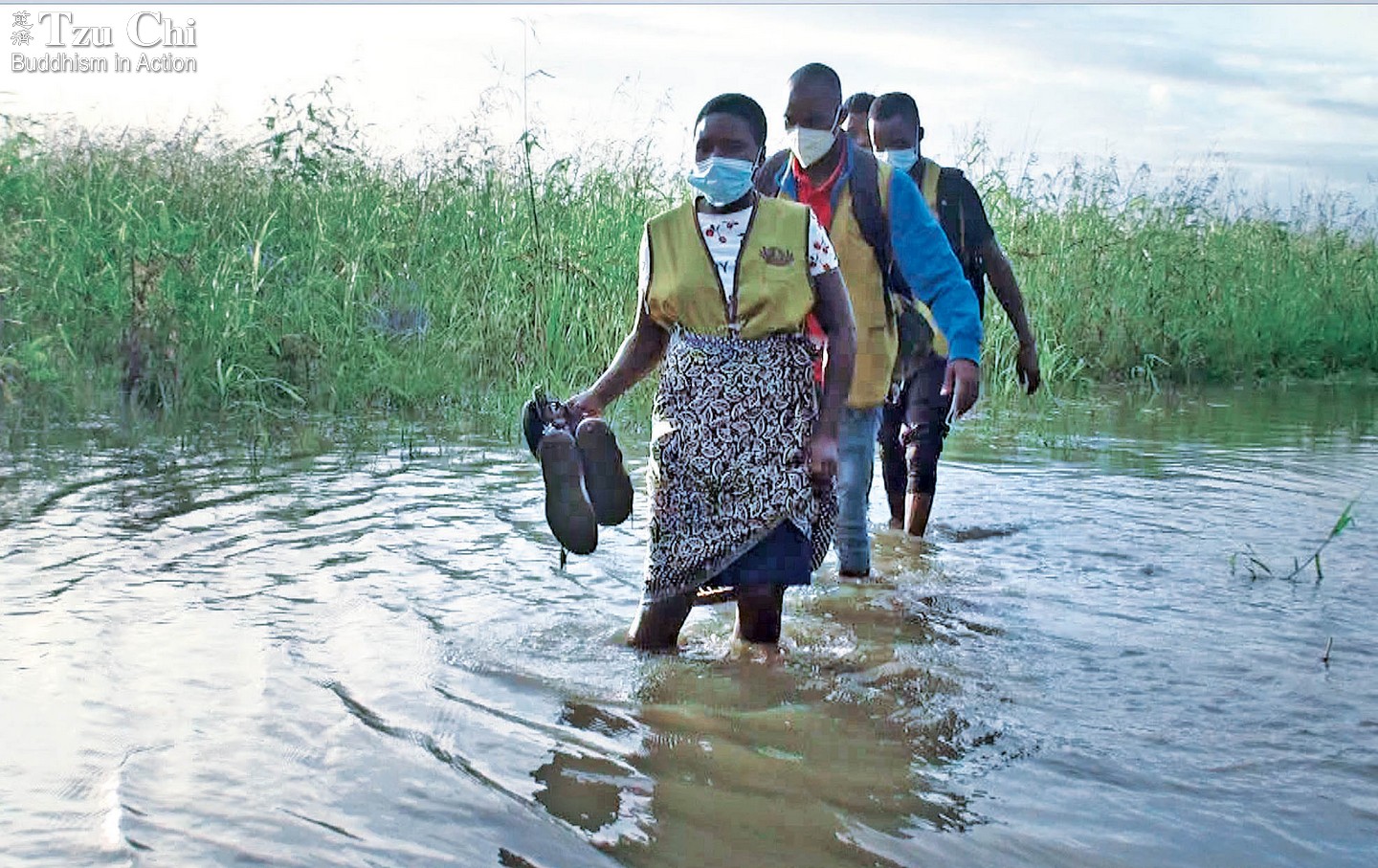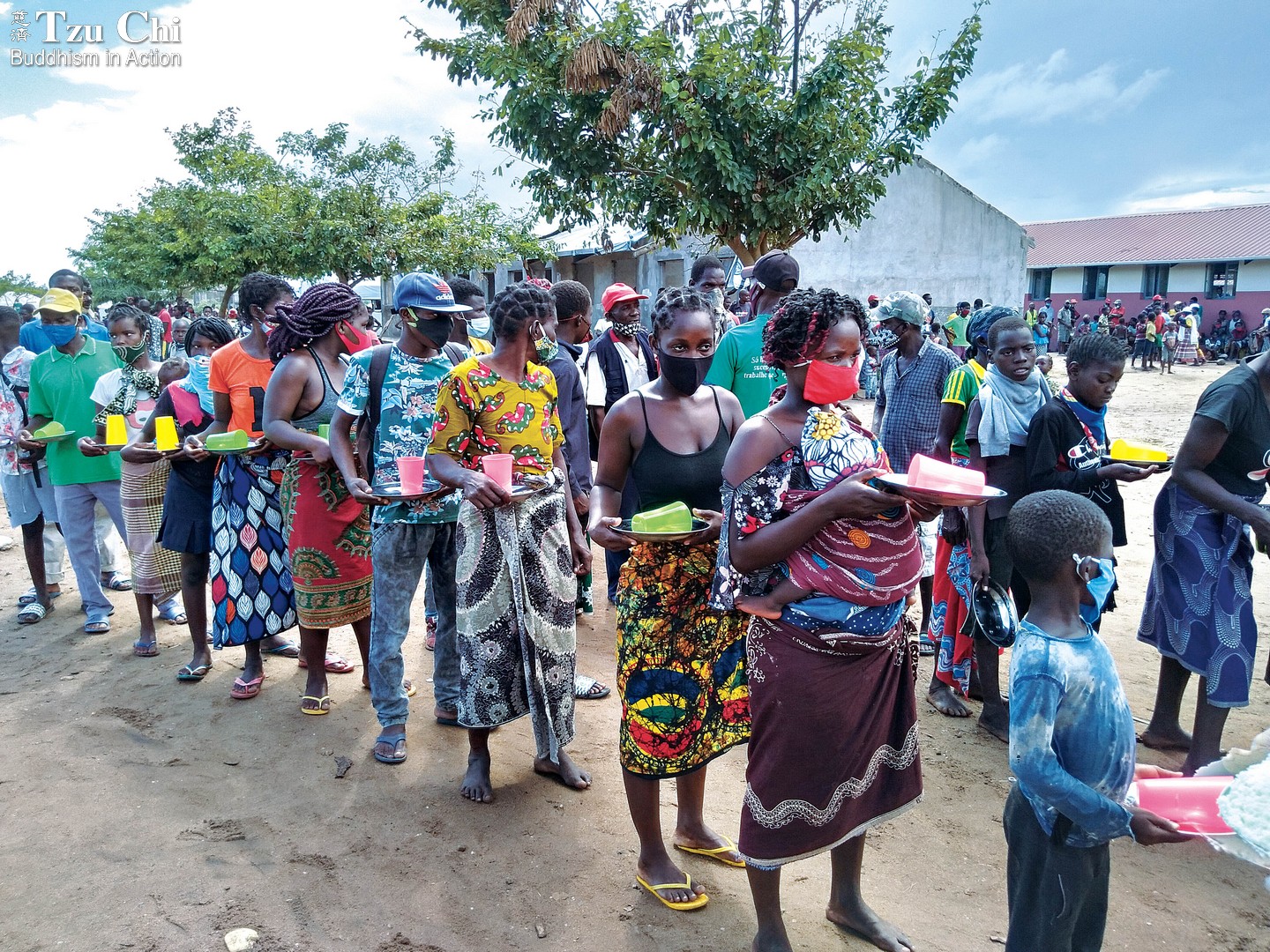By Karmen Long, Tzu Chi International Medical Association
Translated by Tang Yau-yang
President Filipe Nyusi of Mozambique urged the public through the media to be on high alert for a tropical cyclone that would soon make landfall. Knowing that impoverished people did not have the radios, mobile phones, or televisions that would allow them to receive and act on the President’s warning, Tzu Chi volunteers immediately rushed to spread the message. Without missing a beat, they also mobilized in the aftermath of the cyclone to deliver aid. Their adept and orderly handling of the situation was a result of what they had learned from Cyclone Idai two years before.

Tzu Chi volunteers wade through floodwaters to assess damage wrought by Cyclone Eloise. The cyclone caused severe flooding in low-lying areas, including in Tica, Nhamatanda District. Soares Joaquim Santos
Powerful Cyclones Idai and Kenneth hit Africa one after another in 2019, causing serious floods and devastating Mozambique, Zimbabwe, Malawi, and other countries. The magnitude of Cyclone Idai alone was such that United Nations Secretary-General António Guterres labeled it as “one of the worst weather-related catastrophes in the history of Africa.”
Of all the countries affected, Mozambique was hit the worst. In fact, it was ranked as the country most affected in 2019 on the Global Climate Risk Index. Published by the environmental think tank Germanwatch, the index analyzes to what extent countries and regions have been affected by impacts of weather-related events. Mozambique’s vulnerability to the damaging consequences of climate change is magnified even more due to its geographic position and widespread poverty.
Sadly, less than two years after Cyclone Idai devastated Mozambique, Cyclones Chalane and Eloise hit the nation again in the space of about three weeks in December 2020 and January 2021. Mozambique’s central Sofala Province, where families were still trying to put their lives together after Cyclone Idai, suffered from severe flooding. The COVID-19 pandemic had already dealt the people there a heavy blow—now the double natural disasters just made things more difficult for them.

Volunteers launched a hot food program in the aftermath of Cyclone Eloise for shelter residents in Tica, Nhamatanda District, and Guara-Guara, Buzi District. The shelter pictured here is located in Guara-Guara. Dario Nhacale
Disaster preparedness
On December 28, 2020, President Filipe Nyusi of Mozambique warned citizens through the media that Cyclone Chalane would soon make landfall in the central part of the country. He urged the public to be vigilant and prepared. After their painful experiences in the aftermath of Cyclone Idai in 2019, native Tzu Chi volunteers in central Mozambique knew that impoverished people who did not have radios, mobile phones, or televisions would not receive the government’s warnings. They immediately mobilized to spread the news in person so that people would not be caught short by the impending storm.
Volunteers walked to local villages to warn residents about the approaching cyclone, then stayed to help them secure their roofs. Whenever a storm is approaching, people living in shabby huts are most concerned about strong winds blowing off their roofs. When they heard of the coming storm, their first course of action was to look for ways to safeguard their roofs. Younger Tzu Chi volunteers helped by looking for heavy objects for older villagers and putting the objects on their roofs to hold them down. Resources were in short supply, but the scarcity spurred creativity. For example, in Metuchira, Nhamatanda District, Sofala Province, volunteers gave each family five empty, recycled rice sacks with which residents could make sandbags for disaster prevention. The yarn unraveled from the sacks could also be used as rope to tie down roofs.
Cyclone Chalane came and went very quickly, but not without devastating impact. Within just 24 hours, the wind and rain that had come with it had killed seven people and affected 130,000 in the central region. Dino Foi, Denise Tsai (蔡岱霖), and other Tzu Chi volunteers from the national capital of Maputo rushed 1,000 kilometers (620 miles) to the disaster-stricken area to organize and carry out relief work. Within three weeks, they had, with the help of local volunteers, distributed food and building materials to more than 3,000 evacuated families. These families could start rebuilding their lives with the distributed goods as soon as they returned home.
But just a few days later, on January 23, 2021, Cyclone Eloise made landfall in the central region. It brought powerful winds and torrential rains. More than 250 millimeters of rain fell in a single day, flooding the area again. Over 210,000 people were impacted this time.
Volunteers once again jumped into action. Native volunteers in the Nhamatanda District, undaunted by poor sanitary conditions in the disaster areas, waded through sewage-polluted floodwaters to assess damage. These young helpers had themselves been victims of Cyclone Idai two years before.
Soares Joaquim Santos, 23, was one of the volunteers. His parents had died young, so he had been brought up by his grandmother. Poverty had forced him to drop out of school to work and help support his family. He had made a living by carrying and selling water, earning 200 Mozambican meticais (US$3.14) a day by carrying 400 liters (105 gallons) of water. He and his grandmother managed to eke out a living on such a small amount.
Two years ago, their home collapsed during Cyclone Idai. Feeling helpless and at his lowest point, Santos met the Tzu Chi volunteers who had come to his area to help victims of Cyclone Idai. The same storm that had destroyed his home also led him to join Tzu Chi and changed his destiny.
“Before joining Tzu Chi, I was a selfish young man who knew nothing about gratitude,” said Santos. “But Master Cheng Yen’s Great Love has inspired me to step out of my own little world and care for people who are worse off than I. I’m also very grateful to Tzu Chi for helping me return to school. I’ve even learned photography.”
Santos has made home visits to the needy for the past two years, accompanied by volunteers from Maputo. In the process, he has learned to record interviews and use computers. After Cyclone Eloise seriously impacted the central region of Mozambique this year, he hoped to use his photographs to show the world the impact of the disaster from the front lines.
Santos’ dedication to putting the plight of his fellow countrymen on display for the world to see came at a personal cost. Standing water as a result of the cyclone had led to an abundance of mosquitoes, and Santos and another volunteer contracted malaria while they were assessing damage and recording the impact of the storm. But he took medicine and rested for only a day before going out to work again. “I told myself I must quickly win the fight against malaria, or else the world wouldn’t be able to see what Mozambique was like in the aftermath of the cyclone,” he said.
The pictures that Santos had worked hard to capture were powerful. By doing his best in his volunteer work, Santos hoped to show Master Cheng Yen that he and other volunteers in the nation were working very hard to transform lives in Africa.

Shelter residents in Tica line up for food, carrying tableware distributed by Tzu Chi. Luisa Sheila dos Santos Chambala
Hot food for young and old
Tica, in the Nhamatanda District, and Guara-Guara, in the Buzi District, were among the hardest hit areas in the central part of the country. Emergency shelters were set up there, accommodating about 2,000 people in Tica and 10,000 people in Guara-Guara. However, there were not enough tents to go around, forcing many people to sleep in the open air. The government, lacking funds to supply enough food, offered folks in the shelters only one meal a day.
The hot weather and stretched resources made life difficult for the people living in the shelters. Because they had fled the floods in a hurry, they had few, if any, personal belongings with them. They relied on the shelters to feed them, but that meant they were hungry most of the time. A family of seven might receive only a plateful of cornmeal, or folks might line up for food only to find that, when it was their turn to receive their meals, there was no more food for them. When that happened, parents could only turn to their children and say, “We’ll have to starve again today.” Tzu Chi volunteers were able to capture scenes like those on video. These vivid, real, unadulterated records saddened their viewers.
The food shortage problems at the shelters prompted Tzu Chi Mozambique to launch a hot meal program for residents.
On January 28, five days after Cyclone Eloise, people gathered under a big tree at a shelter at Mutamurega Primary School in Tica. They were there for the hot food Tzu Chi volunteers had prepared for them. Volunteers had been busy for days purchasing food ingredients, and the food did not disappoint. The main dish was made with cornmeal, the side dish from soybeans.
Dharma Master Cheng Yen, who was in Hualien, Taiwan, had been kept informed of their situation in the aftermath of Cyclone Eloise. She had instructed that a set of reusable tableware be given to each participant of the meal service. So, in addition to hot food, each resident also received a cloth mask and a set of reusable tableware: a stainless steel plate, a plastic cup, and a spoon.
A recipient thanked Tzu Chi in an interview for giving them the tableware. “We used to have just one food container for our entire family,” the recipient said, “so one of us would stand in line to pick up the meal, and our whole family would eat from that container. When we finished the food and went back to the line for a second helping, we would often find that all the food had been given out.” Now, everyone had their own mask to wear, their own tableware to use, and enough food. They lined up in an orderly manner when it was time to eat, no longer worried about food running out before their turn had come.
January was the rainy season. It rained nonstop for days, making it that much harder for standing water in low-lying areas to drain. Obtaining enough tableware and food for more than 10,000 people in the aftermath of such a massive disaster and during a pandemic was a great challenge for volunteers. Even so, they managed to overcome the difficulties in their way, making Tzu Chi the first NGO to initiate aid distributions after the disaster. The hot food Tzu Chi volunteers provided made life easier for the 12,000 shelter residents in Tica and Guara-Guara in the difficult time after the cyclone.

Supplies for rebuilding life
When a truck loaded with aid goods slowly pulled into the shelter at Mutamurega Primary School on February 16, people of all ages clapped, sang, and danced under the trees to welcome the arrival of the Tzu Chi volunteers.
Tzu Chi had provided hot food at the shelter since January 28. In the meantime, they had also purchased building materials and tools, crop seeds, and food to distribute to residents to help them rebuild their homes and their lives. When volunteers learned in mid-February that the government would be closing the shelter at the school and sending the residents home, they were all set to distribute the goods for residents to take with them. The relief items were trucked to the shelter early in the morning of February 16.
Four hundred and seventy-nine families benefited from the distribution. A volunteer explained that each household would receive a month’s worth of food, including cornmeal, soybeans, salt, sugar, and cooking oil, as well as materials and tools to help rebuild their homes. Since the floods had destroyed many crops, pumpkin, cabbage, sesame, and other crop seeds were also distributed, giving recipients hope that they would be able to slowly put their lives back together. Having been away from home for weeks now, recipient Rosa was looking forward to going home to farm. “Once we start bringing in money from our new crops, we can buy daily necessities. Thank you for your help!” she said.
Nhamatanda District Administrator Tomé José pointed out that local residents were mostly farmers, and the things they needed most to recover from the disasters were shelter, food, and seeds. “We were clobbered by Cyclones Chalane and Eloise in three short weeks,” he said. “Tzu Chi’s supplies will help our people a lot, especially the seeds distributed today, which will enable them to support themselves and make their lives more secure.”
Just as the distribution ceremony was about to begin, a pregnant woman approached a volunteer and asked whether she could get her goods first because she was about to give birth. The volunteer hurriedly handed her supplies to her. After the distribution had concluded, volunteers went to a clinic nearby to check on the woman. They learned that she had given birth to her third child.
The mother, Filismina, was so grateful to Tzu Chi for the timely distribution of supplies that she named her child “Mariano-TzuChi-José.” Locally, a middle name is selected to show respect and is often used to honor an important person.
The volunteers accompanied Filismina back to her home, located in the wilderness on the outskirts of Tica. Filismina, her husband, and their three children lived in a shack built of reeds and mud bricks. Days of rain had led to standing water in their home. Their small house was bare and had no beds, so the family could only sleep sitting up and wait for the floor to dry. Volunteers’ hearts went out to the family when they saw their deprived living conditions. They helped clean up the house and later delivered a Tzu Chi folding bed, blankets, and baby supplies to the family so that they could live more comfortably.
But the story didn’t end there. Two employees at the Tzu Chi office in Maputo felt so much compassion for the family that they put up the money to help them rent a house. The story of Filismina’s family continued to spread. Even the owner of a hotel in Nhamatanda contacted Tzu Chi to say that they were offering Filismina a job to help her provide for her family.
As of mid-March, more than 10,000 people were still living in shelters waiting to return home. Tzu Chi volunteers plan to follow up with more aid to help these people and other survivors get back on their feet.



